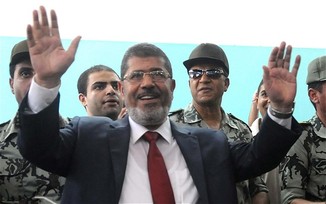
It's perhaps hard to remember the hope we felt during the first flushes of the Arab Spring, when I, for one, was glued to the news websites, reading their live streams and dreaming of real change. Despite the good news coming out of Egypt at first, it seems like the army have been playing for time, hoping that the people would grow tired of revolution and settle for something that doesn't really shift the status quo. It can feel odd cheering on the Muslim Brotherhood, but despite what a raft of internet warriors would have you believe, there are many shades of Islamism, and the Freedom and Justice Party so far have proven closer to the Turkish sort than the Iranian.
So, how to keep the army busy and out of politics? With nearly half a million active soldiers (the 10th largest army in the world, who knew?) they certainly have plenty of personnel. Perhaps if the UN were serious about securing peace in Syria some of these guys could be sent over there, rather than the paltry 300 observers on the last mission. I can't say it's a flawless plan - the Alawites in Syria might be a little worried about letting a largely Sunni force in, for a start. Then again, Syria and Egypt were the same country in the lifetimes of most officers, if not of the grunts. And generals with some proper action on their hands might be less inclined to spend all their time defending their personal fiefdoms.
A pipe dream at best, but given that its clear which side Saudi Arabia is on, it's a more practical solution than asking them to step in and keep the peace.
So, how to keep the army busy and out of politics? With nearly half a million active soldiers (the 10th largest army in the world, who knew?) they certainly have plenty of personnel. Perhaps if the UN were serious about securing peace in Syria some of these guys could be sent over there, rather than the paltry 300 observers on the last mission. I can't say it's a flawless plan - the Alawites in Syria might be a little worried about letting a largely Sunni force in, for a start. Then again, Syria and Egypt were the same country in the lifetimes of most officers, if not of the grunts. And generals with some proper action on their hands might be less inclined to spend all their time defending their personal fiefdoms.
A pipe dream at best, but given that its clear which side Saudi Arabia is on, it's a more practical solution than asking them to step in and keep the peace.
As an aside to this, it's worth pointing out that the army makes up around 1% of the population (when you add reservists as well). When I spent time there before the revolution, the army were hardly present in day to day life, apart from a few towns in Middle Egypt or the New Valley. It was the police who were everywhere. Checkpoints every 10 minutes on the road, 'tourist' police, scores of hideously conspicuous 'plain clothes' cops who were definitely Not Tailing You. According to this there are 1.7 million Egyptian police officers, making Egypt the most heavily policed state on the planet. I sometimes wonder if the checkpoints were there just to find something for them all to do.
In a country with such high unemployment, with 3% directly employed by the security services, and no doubt a much higher percentage relying on them as breadwinners, it's worth considering the effect that has both on the national psyche and on politics. Ever wondered who all the goons were who came out in support of Mubarak? A lot of people have a lot riding on the 'deep state'.
In a country with such high unemployment, with 3% directly employed by the security services, and no doubt a much higher percentage relying on them as breadwinners, it's worth considering the effect that has both on the national psyche and on politics. Ever wondered who all the goons were who came out in support of Mubarak? A lot of people have a lot riding on the 'deep state'.

 RSS Feed
RSS Feed
